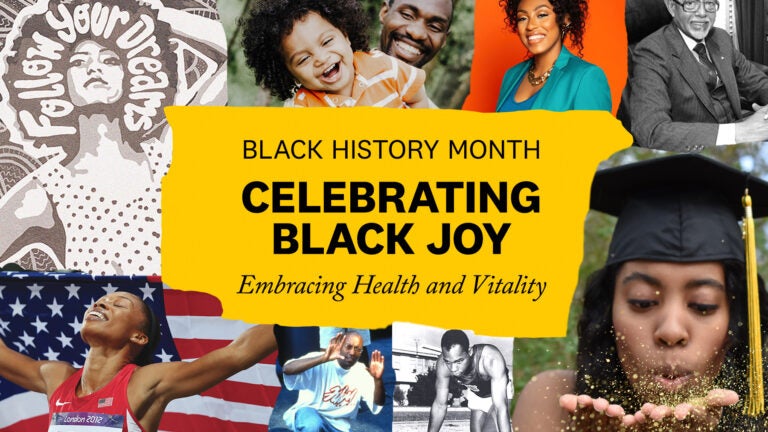
Black History Month: health, wellness and a generous dose of joy
USC experts examine Black health and wellness, the national theme for Black History Month 2022. It shifts the public mindset to a more positive and mindful perspective.
Black History Month takes on new importance as Black leaders draw attention to health – including mental and spiritual health – as a theme for this year’s commemoration. With a nod to that inclusive definition of health, USC has adopted the theme of “Celebrating Black Joy: Embracing Health and Vitality” for its own campuswide events and activities.
USC experts have paused to consider how the continuing fight for racial and social justice takes a toll on the bodies and minds of Black Americans, and how joy and wellness are crucial for their strength and resilience.
Black Joy is at the center of Black identity
“At the core or center of Black culture, Black identity, Black art, Black ideology, and Black community is joy,” said Anita Dashiell-Sparks, a professor of theater practice and Associate Dean of Equity, Diversity and Inclusion at the USC School of Dramatic Arts. “Black joy is the heartbeat and pulse of our survival, our resiliency, our perseverance, our health and wellbeing.
“Joy has been our weapon and superpower in the face of injustice and structural racism.”
Joy has been our weapon and superpower in the face of injustice and structural racism.
Anita Dashiell-Sparks,
USC School of Dramatic Arts
Joy may not be the first thing many think of when it comes to the struggles for racial justice, which have been magnified in the public’s mind through numerous tragedies, including the murders of George Floyd and other Black men and women by police.
“We focus a lot of our public discussions of racial justice on the burdens of Blackness, including unconscious bias, police brutality and systemic racism,” explained Jody Armour, the Roy P. Crocker Professor of Law at the USC Gould School of Law and an expert on the intersection of race and legal decision making. “Consequently, what does not get enough attention and celebration is the upside of being a proud part of the African diaspora and indomitable American descendants of slaves.”
Black Americans suffer a range of emotional distress and trauma from bearing witness to the violent deaths. Shortly after the video of George Floyd’s murder on May 25, 2020, was heavily shared on social media, the U.S. Census Bureau found that 41% of Black Americans were suffering from depression, anxiety or both, according to the bureau’s 2020 Household Pulse survey of 100,000 Americans.
Prior research at USC has shown that racism also harms the physical health of Black Americans.
“The Black Lives Matter movement has, in the past few years, rightfully turned the focus of the world to the persistence of violence against Black people and their bodies,” said Alaina Morgan, an assistant professor of history at the USC Dornsife College of Letters, Arts and Sciences.
Although that singular focus can obscure the diversity of the Black experience, she said Black people have responded to violence by “creating beauty, expressing joy, and radiating pride in their Blackness.”
The blessings of Blackness are also part of African American History
Morgan’s research focuses on the ways that Black people engage with religion, in particular Islam, to dream “of a better, more equitable and more just world.”
“Examining these formations, as well as other forms of Black production like art, music, poetry and literature, respects the complexity of Black people as human beings who are resilient, creative, productive and, yes, joyful,” she explained.
“The blessings of Blackness are many and varied,” Armour agreed. “By keeping its dreams alive, the Black community has amplified the energy of our American shopfronts and tenements, our cinder yards and body shops, our lecture halls and C-suites. By tapping deep reservoirs of creativity, it has forged original art, music, literature, design, and dance that have taken the world by storm.”
He added: “In the words of Tupac Shakur: ‘Long live the rose that grew from concrete.’”
Tapping into Black joy through spirituality
Along with Morgan, several USC experts point to the importance of religious and spiritual practices and beliefs in sustaining Black communities through decades of racism and discrimination.
“In spite of our existence in an oppressive culture that seemingly seeks to dehumanize us, we have fought with both secular and religious tools to hold on to our true worth and value as human beings,” said Broderick Leaks, director of counseling and mental health services at USC Student Health and a clinical associate professor of psychiatry and pediatrics at the Keck School of Medicine of USC.
We have fought with both secular and religious tools to hold on to our true worth and value as human beings.
Broderick Leaks,
Keck School of Medicine of USC
He shared examples of those tools: receiving community and family support, engaging in activism, participating in mental health treatment and support, connecting with faith communities and engaging in religious practices.
Leaks isn’t just an expert on mental health; he is also a student of theology. “As theologian Rev. Canon Kelly Brown Douglas points out, our heritage allows us ‘not simply to survive, but perhaps most importantly to affirm [our] sacred humanity,’” he said. “In this affirmation of our humanity and value, we are able to tap into Black joy; a priceless joy that comes with the recognition that we have held on to our humanity in the face of impossible odds.”
Something within
It’s what Miki Turner calls “that something within.”
Turner, an award-winning journalist and an associate professor at the USC Annenberg School for Communication and Journalism, said while many anthems and hymns have been written to help Black Americans rise above injustice, a song written by pioneering composer Lucie Eddie Campbell— the music director for the National Baptist Convention and the daughter of former slaves — is “particularly fitting for today’s struggles.”
The chorus of the 1919 song “Something Within” includes the line: “Something within me that banishes pain; something within me I cannot explain; all that I know is that there is something within.”
“That something within Campbell is referring to is the inherent strength of our African ancestors whose faith in God allowed them to make a way out of no way,” Turner wrote in a poem inspired by Campbell’s hymn. “Let there be something within all of us that keeps hope alive.”
Faith continues to nourish the Black community during pandemic
The Rev. Najuma Smith-Pollard, the assistant director of community and public engagement at the USC Center for Religion and Civic Culture, finds her joy in the nexus between faith and activism. “My faith informs my activism. I think that’s the case for a lot of people in the Black church,” she noted.
My faith informs my activism. I think that’s the case for a lot of people in the Black church.
The Rev. Najuma Smith-Pollard,
USC Center for Religion and Civic Culture
Smith-Pollard combines her experience as a pastor and expertise as a community leader to help faith leaders become full partners in the work of social change. She described how during the COVID-19 pandemic, she and other faith leaders had to go virtual while still serving the community. The experience affirmed “the church is not defined by its walls and pews and pulpit” but rather “by what we do for the people — feeding people in need, testing for COVID, providing information to communities of color.”
“It also maintained that place where people can come and get their spirit fed,” she said. “That’s so important in a pandemic.”
Our shared vulnerability to COVID-19 creates an opportunity
The pandemic may have also created an opportunity to focus on what Americans have in common, said Christopher Manning, USC’s first chief inclusion and diversity officer. “The COVID pandemic has exposed nationally, and repeatedly, the vulnerability of African American people – and generally speaking, Black and brown people – within the healthcare context,” he said.
Despite the higher toll of pandemic-related health challenges for Black Americans, Manning said all Americans regardless of race, class and gender feel vulnerable to COVID-19.
“Because it’s a shared experience, one would hope that we’re able to leverage the trauma of having gone through that experience together to come out of it and build more access for everyone together,” Manning said. “It provides us with a big opportunity to hopefully evolve as a nation and as a people.”
Finding joy in Black history’s firsts
Elaine Bell Kaplan believes there is much to celebrate in recent history. Kaplan, a USC Dornsife professor of sociology, listed just a few firsts for Black Americans as a source of joy: the first African American secretary of defense, retired Gen. Lloyd Austin; the first Black woman vice president, Kamala Harris; and the commitment by President Joe Biden to nominate the first Black woman Supreme Court justice.
“Now more than ever, Black History Month remains relevant because it sets aside time for us to learn and reflect upon the ways this history highlights the ideals and failures of the U.S. experiment with democracy,” Kaplan said. “Through social movements and political and cultural traditions, the Black community has engaged notions of freedom and equality since its founding.”
She quoted the influential Black feminist author bell hooks: “My hope emerges from those places of struggle where I witness individuals positively transforming their lives and the world around them. Educating is always a vocation rooted in hopefulness.”



